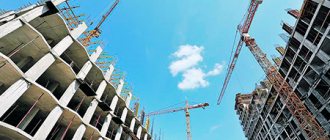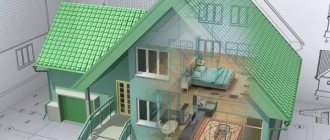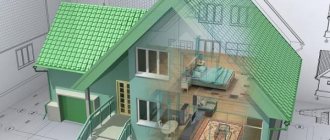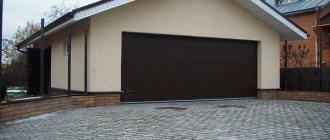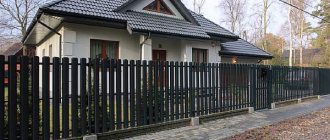Construction of capital buildings without obtaining permission for them can only be started if this permission is not required.
The list of such structures and buildings is specified in Part 17 of Art. 51 Civil Code of the Russian Federation. Construction work begun without obtaining permission in other cases entails liability under Article 9.5 of the Code of Administrative Offenses of the Russian Federation.
This article provides for the imposition of an administrative fine for violators: from 2 thousand rubles (for individuals) to a million rubles (for legal entities).
Is it possible to build a house without a building permit, what will happen if you build it? You will find answers to questions in the article.
Unauthorized construction
The concept of unauthorized construction is regulated by Article 222 of the Civil Code of the Russian Federation. It is subject to demolition or bringing it to the standards regulated by construction rules and regulations that are related to development (Civil Code of the Russian Federation, Article 222).
Demolition or bringing to standards is paid for by the person who built the capital structure, and if the identity of the builder is not established, then the payment comes from the pocket of the owner/tenant of the land plot.
A structure is not recognized as an unauthorized construction if it was built in violation of the peculiarities of the use of the site, which the owner of this site did not know about and could not know about.
Signs of unauthorized construction:
- Placed on a site where construction does not imply the construction of such a building.
- Placed on a site that is not provided in accordance with the established procedure.
- Constructed without obtaining permission or in violation of urban planning regulations.
- It was created on a site that ignored the legal restrictions on its use.
In order for a structure to be recognized as an unauthorized construction, it must meet at least 1 of the above criteria.
What happens if you build it: responsibility and consequences
Responsibility for the construction of an unauthorized structure may arise under several articles of the Code of Administrative Offenses of the Russian Federation:
| Article | Responsibility | ||
| Individual | Executive | Legal face | |
| 9.5 | Fine 2-5 tr. | Fine 20-50 t.r. | Fine 500 rub. – 1 million rubles or suspension of activities for up to 90 days |
| 7.1. if the cadastral value is established | Fine 1-1.5%, but not less than 5 tr. | Fine 1.5-2%, but not less than 20 tr. | Fine 2-3%, but not less than 100 rubles. |
| 7.1. if the cadastral value has not been established | Fine 5-10 tr. if the cadastral value has not been established | Fine 20-50 t.r. if the cadastral value has not been established | Fine 100-200 rubles. if the cadastral value has not been established |
| 8.8. if the cadastral value is established | Fine 0.5-1%, but not less than 10 tr. | Fine 1-1.5% but not less than 20 tr. | Fine 1.5-2%, but not less than 100 rubles. |
| 8.8. if the cadastral value has not been established | Fine 10-20 tr. | Fine 20-50 t.r. | Fine 100-200 rubles. |
| 9.4.1 | Warning or fine 1-2 tr. | Warning or fine 20-30 tr. | Warning or fine 100-300 rubles. |
| 9.4.2 | Fine 2-4 tr. | Fine 30-35 t.r. | Fine 300-600 rubles. or suspension of activities for up to 60 days |
| 9.4.3 | Fine 4-5 tr. | Fine 35-45 tr. | Fine 700 rub. – 1 million rubles Or suspension of activities for up to 90 days |
Responsibility under Article 9.5, paragraphs 2 and 3 of Article 9.4 is also borne by an entrepreneur who carries out his activities without forming a legal entity.
Under Article 9.5, he faces a fine of 20-50 thousand rubles or suspension of activities for up to 90 days, under paragraph 2 of Art. 9.4 - fine 35-40 tr. or suspension of activity for a period of up to 60 days, under paragraph 3 of the same article - a fine of 40-50 thousand; suspension of activity for a period of up to 90 days.
Is it possible to avoid a fine?
To avoid a fine, you can legalize the construction.
The “dacha amnesty” expires only on March 1, 2021 . And if you register the property rights under it in a simplified manner (if, of course, the self-construction falls under its criteria), then you can avoid the imposition of an administrative fine.
This law covers residential buildings and commercial buildings that require a construction permit and were built on plots allocated for gardening, dacha farming, individual housing construction or personal construction for auxiliary purposes within the city.
To do this, you must provide documents confirming ownership of the site and a technical plan drawn up by a cadastral engineer to Rosreestr.
What kind of construction may be illegal?
The lack of permitting documentation is a valid reason for filing a complaint. But it is not always possible to accurately establish this fact without contacting an authorized government agency, especially if the developer refuses to provide approval. In any case, you should contact the regulatory authorities if the following work is being carried out:
- reconstruction of a residential building or a separate part of it;
- construction of a new building after demolition or dismantling of the old one (it may turn out that permission was initially obtained only for its major repairs);
- converting residential real estate into non-residential property or vice versa (without permission this is illegal, even if the property was built legally);
- construction of an additional structure on the land plot;
- construction of any extension to an existing property;
- construction on a land plot that has a different purpose, etc.
Any capital structure can be built only after obtaining permission. Approval will also be required if it is located near a historical or environmental site.
How to obtain and register ownership rights if the building has already been built?
There are two ways to legalize a self-construction and obtain registration documents for it - administrative legalization or through the court. It all depends on the conditions of construction of the building.
How to legalize it on your own land?
To register a self-construction built on such a site, you will need to submit a certificate of ownership or an extract from the Unified State Register of Real Estate to the town planning and land commission.
How to register an individual housing construction project built on a plot of land or a garden plot?
It is necessary to obtain a municipal act approving the construction , and after completion of the work, notify the administration and provide a technical plan. If approval has not been received, you will have to resort to contacting the state inspectorate, pay a fine and legalize the construction.
If the application to the state committee is refused, then it will be necessary to take legal action.
On someone else's property
It will be possible to legalize the construction of a structure erected on someone else’s land only if it can be proven in court that part of the land belongs to the person who built the structure.
If there is no evidence, then the owner of the site has the right to demand the demolition of the structure at the expense of the person who built it, or he has the right to register ownership of the structure in his own name. In this case, the new owner will have to reimburse the developer for construction costs.
Registration of an object located in a municipal land plot
To legalize a building erected on land owned by a municipality, it must meet the following criteria:
- the intended purpose of the land;
- SNiP standards;
- fit into the landscape;
- did not violate the rights of third parties.
If it meets all these criteria, then the construction can be legalized administratively or judicially.
If the intended purpose of the object corresponds to one of the following:
- specially protected resource;
- forest or water fund lands;
- cultural heritage site,
then legitimizing self-construction is a hopeless task.
Illegal issuance of permits
During communication with the developer, it may become clear that he has received all the necessary permits (most likely, he himself will present them to the applicant upon first request). But even in this case, you should not ignore the situation if, as a result of the work being carried out, harm or damage is caused to other properties located in the neighborhood. For example, if after the construction of a store building near a residential building, cracks appeared along its facade, this is the basis for contacting the regulatory authorities (even if all approvals are in place). In such a situation, there is reason to believe that the permits were obtained illegally and unreasonably.
Only the Prosecutor's Office has the right to check the fact of illegal issuance of permits, and this should be addressed to resolve the situation (to minimize damage from illegal construction, this should be done as quickly as possible). In order for the complaint to be considered as quickly as possible, the applicant must contact his territorial unit, guided by the information https://genproc.gov.ru/contacts/map/?DISTR=&SUBJ=.
The written document must contain the following information:
- details of the parties (full address, contact information, etc.);
- an accurate description of the current situation: when the work began, how it was carried out, whether the developer presented the appropriate permits, etc.;
- negative consequences (cracks in the facade of the building, flooding with sewage, subsidence of a neighboring house, etc.);
- references to the norms of current legislation that should guide the Prosecutor's Office when considering an appeal and analyzing the current situation;
- clearly formulated requirements for checking the legality of issuing permits.
The complaint should be accompanied by materials (photos, videos, expert opinions) that will help the authorized employee of the Prosecutor's Office make a decision on the fact of the complaint. The prepared document must contain an accurate description of them.
The procedure for legalizing self-construction
First, you should try to legalize any self-construction administratively, and it can be legalized if it meets the following requirements:
- There is no building permit, but a fine has been paid.
- The type of permitted use of the site does not prohibit the type of construction.
- No violation of the interests of third parties has been established.
- SNiP standards were observed.
In the case where at least one criterion does not meet the squatter’s criteria, it is almost impossible to legitimize it even through the courts. But if the administration refuses to legalize an object that meets all the requirements, then you can go to court.
To do this you need:
Conduct a compliance assessment.- Try to legitimize self-construction in a pre-trial manner: get a refusal from the BTI, Rosreestr or other authorized bodies.
- Prepare the evidence base and conduct the necessary examinations.
- File a claim.
- Submit the claim documents to the court. If the value of the claims is less than 50 thousand rubles - global, and if higher - city or district.
- Register a claim and if the demands are legal, the court initiates civil proceedings.
- Conduct court hearings.
- Pick up a copy of the extract from the court order.
If the plaintiff's demands were not satisfied, he has 10 days to file an appeal to a higher authority. And if, nevertheless, one of the authorities takes the side of the plaintiff, then it will be possible to begin registering ownership of the building.
Where to go
Municipal authorities are responsible for issuing permits within the city. But depending on what actions the violator performs and what the legal status of the land plot he is using is, you can file a complaint with:
- Regional Department of Construction and Urban Planning. If an extension is being added to a building that has historical value, or a real estate property is being built on a plot of land not intended for this purpose, you should contact this regional department, based on the territorial affiliation of the building.
- Office of Rosreestr, which is authorized to carry out state land supervision.
- Rostekhnadzor. A complaint should be filed with this department if there are suspicions that the developer has not received the necessary permits, uses prohibited materials for construction, or does not have permission to carry out the work.
- The municipal authority that issued the permit for illegal construction. An appeal is submitted if there are obvious violations of standards during the implementation of work (even if the developer has received all the necessary permits).
- Prosecutor's office. If the problem cannot be resolved by contacting other regulatory authorities, you should contact the Prosecutor's Office. This should also be done if an emergency situation arises due to illegal construction. Not only the applicant, but also the regulatory authority to which a complaint was previously filed regarding the illegal construction of an object can appeal to the Prosecutor's Office.
- Court. If an illegal building is located on the territory of a land plot, the owner of which refuses to demolish the object, an appropriate court decision will be required to force its demolition. Legal proceedings will also help to recover from the violator monetary compensation for moral and material damage (for example, if a neighboring apartment building in which other residents lived was destroyed due to illegal construction).
If there are concerns that current construction may lead to the destruction of nearby buildings, houses or buildings, you should immediately contact the Prosecutor's Office.
How to draw up a statement of claim and what documents are needed?
To consider a court case on the legalization of self-construction, both general and auxiliary documents will be required:
- a receipt confirming the fact of payment of the state duty;
- passport of a citizen of the Russian Federation;
- land plot plans - urban planning and cadastral;
- technical passport from BTI;
- correspondence with the administration with attempts to legitimize squatter construction administratively;
- other documents that can be used as evidence.
Cost of expenses
In addition to the costs of paying off the fine that was issued for unauthorized construction, you will have to pay a court fee. It is calculated in accordance with paragraph 1 of paragraph 1 of Article 333.19 of the Tax Code of the Russian Federation.
And it depends on the cadastral value of the property:
At a cost of 20 tr. – 4%, minimum – 400 rubles.- 20001 – 100 tr. – 800 rubles + 3% of the amount that exceeds 20 tr.
- 100001 – 200 t.r. – 3.2 tr. + 2% of the amount that exceeds 100 tr.
- 200001 – 1 million rubles – 5.2 tr. + 1% of the amount that exceeds 200 tr.
- Over 1 million rubles – 13.2 tr + 0.5% of the amount exceeding 1 million, but not more than 60 tr.
In addition to these costs, the assistance of lawyers may be required in drawing up a statement of claim and representing the interests of the plaintiff in court.
What to do after a positive court decision?
If the court sided with the plaintiff, then it will be possible to register the property rights in Rosreestr. To do this you will need to provide:
- application for registration of property rights;
- the court's decision;
- power of attorney for representatives (if documents are not submitted in person);
- receipt for payment of state duty - 2 thousand for individuals, 22 - for legal entities.
A legal entity can independently provide constituent documents or Rosreestr will do it for it. Additional documents may be required, which will be reported by the organization's employees. The period for registering property rights will be 10 working days.
How to make sure that construction is illegal
The first thing you should do when you discover that a new building is being built next door or the façade of a house is being reconstructed is to make sure that such work is legal. The absence of permitting documentation will significantly simplify the process of appealing such actions of the developer. But even if it turns out that the authorized bodies have issued a construction permit, it is possible that the work being carried out is far from the one for which it was issued.
If the developer refuses to provide the necessary documents or it is not possible to establish its location, you can verify the legality of the construction on the Rosreestr website. Any citizen has the right to send such a request online using the link https://rosreestr.ru/wps/portal/online_request.
The search can be carried out using one of the proposed criteria: address, cadastral or conditional number:
Illegal and unreasonable receipt of permits is a reason to file a complaint with the Prosecutor’s Office.
When can the court refuse?
A court decision may be directly opposite to the statement of claim and the squatter building may be ordered to be demolished . The court will refuse to satisfy the claims if the squatter building violates any of the following provisions:
The purpose of the structure does not correspond to the intended purpose of the land.- They violate SNiP and fire safety standards.
- Does not fit into the landscape of the territory owned by the municipality.
- Violates the rights of third parties (for example, enters a site owned by a third party).
The Supreme Court stated that the very fact that the structure is an unauthorized construction cannot become a reason for refusing to satisfy the claims.
And in order to obtain permission to register property rights, it will be necessary to carefully prepare for the consideration of the case in court, work through the evidence base and work out a position on defending the legal rights to legalize self-construction (if, of course, they are legal).
The court will not decide to demolish the building if it does not violate the following regulations:
- Art. 304 of the Civil Code of the Russian Federation – the right to protection of property rights;
- the building is not real estate - clause 29 of the Resolution of the Plenum of the Supreme Court of the Russian Federation No. 10 of 04/29/2010;
- the construction is legalized in accordance with clause 3 of the Civil Code of the Russian Federation 222;
- the owner did not know and could not know that his construction violated the construction restrictions relating to his land plot, clause 1 of the Civil Code of the Russian Federation 222;
- ownership of the building was registered until 09/01/2018;
- the owner owns the territory on which the building is erected.
In any other cases, the decision can be reviewed in appellate courts of various levels.
But the decision to legalize unauthorized construction, which objectively violates certain construction requirements or the rights of third parties, is unlikely to be satisfied.
When is a building permit not required?
The Town Planning Code of the Russian Federation (Article 51) indicates several cases when a developer may not obtain permission
for construction:
- in the case of building a garage on your own site, which is not intended for business activities;
- construction of buildings on plots intended for dacha or gardening;
- installation of structures and structures that do not fall under the classification of capital construction (kiosk, tent, canopy);
- construction of auxiliary structures.
In addition, there are regional programs that allow certain construction to be carried out without obtaining permits.
Cases from judicial practice
To assess the chances of satisfying claims, you can familiarize yourself with the precedents that have taken place in judicial practice regarding the legalization of unauthorized construction:
The decision of the Supreme Court, which states that the lack of permission for unauthorized construction is not grounds for demolishing unauthorized construction. The case was remanded for retrial to the court of first instance.- A lawsuit in a case from a neighbor of the owner of a self-built building that violates SNiP standards. The court satisfied the claims and declared the construction unauthorized and ordered the defendant to demolish the building.
- Claim in the case of recognition of ownership of an unauthorized construction. The claims were satisfied in full, allowing the plaintiff to register ownership of the building.
